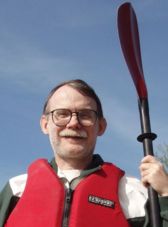River Network is a crucial national organization working to build the capacity and effectiveness of grassroots activists and groups that work to improve water quality. This weekend at its annual River Rally in Baltimore, 6 new River Heroes will be named. Here’s your sneak peek:
Dr. T. Allan Comp
Founder and Coordinator of the Appalachian Coal Country Watershed Team (ACCWT) and the Western Hardrock Watershed Team (WHWT).
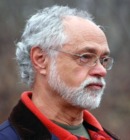 An employee of the Office of Surface Mining Reclamation and Enforcement, Comp works through the ACCWT and the WHWT to support the efforts of small community/watershed groups in mining communities of Appalachia and the Rocky Mountains. The ACCWT and the WHWT are coalitions of grassroots-level groups created to repair the environmental degradation left by historic coal mining while creating economic stability needed in rural communities.
An employee of the Office of Surface Mining Reclamation and Enforcement, Comp works through the ACCWT and the WHWT to support the efforts of small community/watershed groups in mining communities of Appalachia and the Rocky Mountains. The ACCWT and the WHWT are coalitions of grassroots-level groups created to repair the environmental degradation left by historic coal mining while creating economic stability needed in rural communities.
The ACCWT, headquartered in Beckley, W.Va., serves an eight-state area comprising Pennsylvania, Ohio, Maryland, Virginia, West Virginia, Kentucky, Tennessee and Alabama. Its goals include building local capacity to fix problems, monitoring water quality, enhancing community outreach and education, developing local communities, and developing the professional skills of the VISTA Volunteers who serve with the organization. The WHWT was founded at the request of the Colorado Division of Reclamation, Mining and Safety, to emulate the successes of the ACCWT. Both teams are supported by an innovative partnership between AmeriCorps VISTA and the Office of Surface Mining.
Ella Filippone
Passaic River Coalition, New Jersey
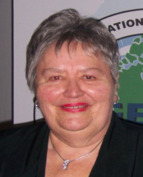 The Passaic River Basin is the most densely populated area in the State of New Jersey. It is composed of eight counties and 118 municipalities totaling 2.5 million people. While the Passaic is only 81 miles long, its eight major tributaries contribute over 1000 river miles to the watershed. In 1969, the Passaic River was recognized by the U.S. Environmental Protection Agency as one of the two most polluted rivers in the United States.
The Passaic River Basin is the most densely populated area in the State of New Jersey. It is composed of eight counties and 118 municipalities totaling 2.5 million people. While the Passaic is only 81 miles long, its eight major tributaries contribute over 1000 river miles to the watershed. In 1969, the Passaic River was recognized by the U.S. Environmental Protection Agency as one of the two most polluted rivers in the United States.
Ella F. Filippone has been the Executive Director of the Passaic River Coalition for the past 38 years, racking up major victories for surface water and aquifers along the way. In the 1990s, Ella discovered $10 million in an old bond act and shepherded it through the state legislature so that New Jersey could initiate the purchase of 17,000 acres in the high headwaters of the Passaic, a critical water supply resource.
Cynthia Skrukrud
Illinois Sierra Club
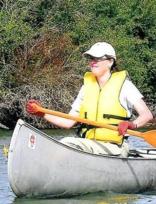 Cindy Skrukrud has lived the past 22 years in the glacial hills of Northern Illinois overlooking the mighty Nippersink Creek, a tributary to the Fox River of southern Wisconsin and northeastern Illinois. Along with her work with Sierra Club, Prairie Rivers Network, Environmental Law & Policy Center and Openlands to protect streams and wetlands throughout Illinois, working with fellow citizens and other stakeholders to protect the Nippersink and streams throughout the Fox River watershed has been her passion.
Cindy Skrukrud has lived the past 22 years in the glacial hills of Northern Illinois overlooking the mighty Nippersink Creek, a tributary to the Fox River of southern Wisconsin and northeastern Illinois. Along with her work with Sierra Club, Prairie Rivers Network, Environmental Law & Policy Center and Openlands to protect streams and wetlands throughout Illinois, working with fellow citizens and other stakeholders to protect the Nippersink and streams throughout the Fox River watershed has been her passion.
Cindy is currently working to establish the first National Wildlife Refuge in the Chicago region within the Nippersink watershed in IL and WI. For the past six years, she has chaired the Fox River Study Group, a multi-stakeholder group working to study the conditions of the Fox River and to figure out the most cost effective means to clean up problems on the Fox and prevent future ones. They’ve teamed up with the sewage treatment plant operators they used to battle with. For the past year, she has helped to form a similar group in the Hickory Creek watershed, another river south of Chicago facing development pressures. Out of such negotiations, the Village of Antioch was the first town in Illinois to adopt a ban on phosphorus-containing lawn fertilizer; now a dozen other towns have followed suit and the trend is continuing to grow.
Roger Frymire
“The Mad Kayaker,” Charles River Watershed Association, Massachusetts
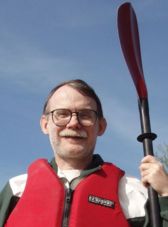 Retired for 20 years, Roger started down the slippery slope of watershed volunteering after borrowing – for 4 years – a friend’s canoe. Now armed with a kayak, Roger’s dedication to rivers is inspiring.
Retired for 20 years, Roger started down the slippery slope of watershed volunteering after borrowing – for 4 years – a friend’s canoe. Now armed with a kayak, Roger’s dedication to rivers is inspiring.
Trained by the Charles River Watershed Association and aided by Merrimack River Watershed Council and Mystic River Watershed Association, Roger did extensive research on the location and ownership of suspect outfall pipes, then scoured the shorelines by kayak using sight, sound, and smell to locate flowing pipes to sample. On the Charles to the Mystic Watershed and more recently to the Merrimack, he has taken well over 2000 water samples for fecal bacteria enumeration – identifying over 100 outfalls with sewage contamination.
Roger’s work has received national recognition but has tried to keep the focus on the watersheds instead of personality, and to give plaudits and credit to those communities working hard to find and fix the sources of problems identified. The first enforcement person he worked closely with at EPA gifted him the nick-name: “The Mad Kayaker,” a label he encouraged because it allows writers a memorable hook to get people interested in an otherwise often disgusting story.
Dean Naujoks
Yadkin Riverkeeper, North Carolina
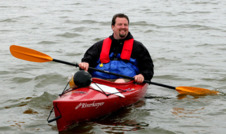 Born in PA and raised on the Upper Delaware (National Scenic) River, Dean has over 18 years of environmental non-profit experience in North Carolina. He began his non-profit career with the NC Wildlife Federation for eight years from 1991-1999 and started the Upper Neuse Riverkeeper from 2001 to 2008. As of 2008, he became Yadkin Riverkeeper.
Born in PA and raised on the Upper Delaware (National Scenic) River, Dean has over 18 years of environmental non-profit experience in North Carolina. He began his non-profit career with the NC Wildlife Federation for eight years from 1991-1999 and started the Upper Neuse Riverkeeper from 2001 to 2008. As of 2008, he became Yadkin Riverkeeper.
His work with the Muddy Water Watch (MWW) Program in the Neuse Basin has developed into a successful statewide initiative; being seen as an effective tool to engage the public to monitor and keep construction sites in compliance with water quality laws. The MWW Program continues to grow nationally.
Dr. Liane Russell
Tennessee Citizens for Wilderness Planning, Tennessee
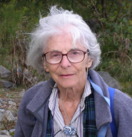 Liane Brauch (Lee) Russell has studied mammalian genetics for more than 45 years at Oak Ridge National Laboratory’s Biology Division. In the mid-60s, Lee developed a keen appreciation for the river gorges of Tennessee’s Cumberland Plateau and organized a grassroots environmental advocacy group, Tennessee Citizens for Wilderness Planning (TCWP). In 1966, when plans were aired to dam the Obed River, Lee and TCWP mounted an aggressive, and ultimately successful, campaign to keep this river system free flowing. By researching information, publicizing it in the media, working with federal and state agencies and gaining the ear of legislators, they managed to secure designation of a National Wild and Scenic River for the Obed River in 1976.
Liane Brauch (Lee) Russell has studied mammalian genetics for more than 45 years at Oak Ridge National Laboratory’s Biology Division. In the mid-60s, Lee developed a keen appreciation for the river gorges of Tennessee’s Cumberland Plateau and organized a grassroots environmental advocacy group, Tennessee Citizens for Wilderness Planning (TCWP). In 1966, when plans were aired to dam the Obed River, Lee and TCWP mounted an aggressive, and ultimately successful, campaign to keep this river system free flowing. By researching information, publicizing it in the media, working with federal and state agencies and gaining the ear of legislators, they managed to secure designation of a National Wild and Scenic River for the Obed River in 1976.
Similarly, after helping to defeat an even larger dam proposal for the Big South Fork of the Cumberland River, Lee won a National River & Recreation Area designation for the 125-acre Big South Fork in 1974.
Lee played a lead role in the drafting and passage of Tennessee’s State Scenic Rivers Act, which is the first such act in the United States, as well as in the development and designation of the 11-mile North Ridge Trail in Oak Ridge as a Federal and State Recreation Trail. She also played a primary role in the passage of the State Natural Area Act, and the designation of Frozen Head as a State Park and Natural Area. Over the years, she has led the charge on strip-mining issues such as state and federal bills and Land Unsuitable for Mining Petitions (LUMP).
Through her work, more than 150,000 acres of land and more than 120 miles of river are permanently protected from adverse development in the Cumberlands. Because of her efforts on strip-mining, many of Tennessee’s rivers are spared siltation and acid drainage. Her dedication, passion and tenacity have helped protect lands and water to make them available for generations to come.
About the Award
River Network is a national, nonprofit organization dedicated to helping people understand, protect and restores rivers and their watersheds. The National River Hero, a peer-nominated award started by River Network in 2002, annually celebrates rivers and recognizes individuals in the watershed movement who provide leadership, inspire the work of others, utilize innovative strategies and techniques to achieve significant results, and foster the growth and sustainability of a watershed community. To date, 28 individuals have been honored as National River Heroes. Awards will be presented on May 31 at River Network’s annual National River Rally.
For more information: www.rivernetwork.org/rally

